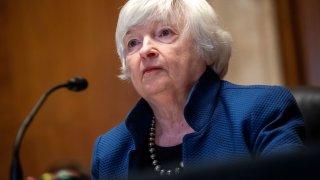
- The Treasury Department will begin conducting emergency cash-conservation steps.
- Economists say those so-called extraordinary measures will allow Treasury to pay off the government's bills without issuing new debt for up to three months.
- That should buy Congress enough time to raise or suspend the debt ceiling. The alternative would be a never-before-seen default on U.S. debt.
The Treasury Department will begin conducting emergency cash-conservation steps on Monday to avoid busting the federal borrowing limit after a two-year suspension of the debt ceiling expired at the end of July.
Economists say those so-called extraordinary measures will allow Treasury to pay off the government's bills without floating new debt for two to three months. After that, Congress will need to either raise or suspend the borrowing limit or risk the U.S. defaulting on its obligations.
The limit, a facet of American politics for over a century, prevents the Treasury from issuing new bonds to fund government activities once a certain debt level is reached. That level reached $22 trillion in August 2019 and was suspended until Saturday.
Get Boston local news, weather forecasts, lifestyle and entertainment stories to your inbox. Sign up for NBC Boston’s newsletters.
The new debt limit will include Washington's additional borrowing since summer 2019. The Congressional Budget Office estimated in July that the new cap will likely come in just north of $28.5 trillion.
The Treasury Department notified Congress on Monday afternoon to confirm that it's begun the emergency measures. Treasury Secretary Janet Yellen explained to House Speaker Nancy Pelosi, D-Calif., that her department will halt regular payments to a variety of retirement funds.
"I will be unable to fully invest the portion of the Civil Service Retirement and Disability Fund (CSRDF) not immediately required to pay beneficiaries, and that a 'debt issuance suspension period' will begin on Monday, August 2, 2021 and last through Thursday, September 30, 2021," Yellen told the House speaker.
Money Report
"I respectfully urge Congress to protect the full faith and credit of the United States by acting as soon as possible," she added.
Previously, Yellen impressed upon Pelosi that trillions in federal spending and Covid relief laws have made it more difficult to say how long Treasury will be able to sustain its extraordinary measures.
Though the federal government has never defaulted, economists say such an event would have disastrous effects on the U.S. economy by spiking interest rates.
"The government needs to have funds, for example, to pay interest on its debt, and if it were to stop paying interest that could be extremely unsettling for financial markets," Harvard University economics professor Karen Dynan told CNBC on Thursday.
These funds are needed to pay government workers and send out Social Security checks, said Dynan, a Treasury official during the Obama administration. "People depend on that money and could suffer a lot of hardship if they don't get it as scheduled."
Still, near-certain economic calamity hasn't stopped politicians from using the debt ceiling as a political football over the years.
During the Obama administration, Republicans often used the specter of default as leverage to win spending reductions and other policy priorities from the White House in exchange for voting to raise the debt limit.
But with Democrats having marginal control in both the House and the Senate, Dynan echoed a consensus view that isn't too concerned about an eventual compromise.
The extraordinary measures allow the Treasury to redeem certain investments in federal pension programs and halt new ones in order to generate cash without raising the overall debt. But when those methods are exhausted, there is no backstop.
Unless the government floats new Treasury bonds, payments on Social Security, Medicare, military spending, interest on U.S. debt and other obligations just stop.
Lindsey Piegza, chief economist for Stifel, noted that extraordinary measures are neither new, nor are they cause for immediate alarm.
"We've implemented extraordinary measures before, so from a procedural standpoint this isn't much of a concern," she told CNBC last week.
"However, the implication is a further showdown in Washington eroding the average American's confidence in a cohesive, functioning government," she added. "It also highlights the ongoing infighting among policy officials which will make it more difficult for the two sides to come together on anything from spending to infrastructure to the debt ceiling."
While economists may be optimistic about an eventual suspension, the calculus is far more complicated in Washington.
The White House has all but washed its hands of the debt-ceiling morass.
"It is Congress's responsibility to raise or suspend the debt limit in order to pay for the spending it has already authorized over the years," said a White House official who spoke on condition of anonymity to discuss an ongoing negotiation.
In Congress, few politicians, Democrat or Republican, want to be cast as endorsing an ever-ballooning federal debt 15 months before an election, even if the government's spending is otherwise popular.
Complicating matters this year is the fact that members of Congress in both parties are eager to find compromise on a trillion-dollar infrastructure deal.
On top of that, Democrats are planning to pass a $3.5 trillion domestic spending bill along party lines later this year.
Pelosi must not only drum up enough votes to pass a debt-ceiling suspension or a hike, but also protect her razor-thin majority.
An aide to House Democratic leadership told CNBC that discussions about the ceiling are ongoing, and that the party's top lawmakers will not risk the full faith and credit of the United States.
The aide did not say which path forward Congress will pursue.






